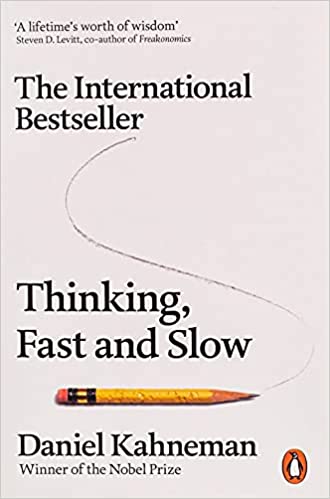“You know your most annoying flaw?” says my friend Sam, eyeing me critically over the rim of a coffee cup.
Uh-oh. I’ve known Sam for many years. This means two things. One, she’ll be right. She has decades of evidence to back up her findings. Two, we know each other so well that she won’t feel she needs to be polite. I brace myself.
“Indecision. You can’t decide about anything. Even whether you wanted a pastry with your coffee. Or which kind of coffee you wanted. How have you got this old without being able to make decisions?”
My Indecision Is Final
It’s a good question. I can make very basic decisions. Enough to keep me alive. I decide not to step into traffic when the light’s against me, or mend the toaster while it’s switched on.
But when I’m forced to weigh up more complex decisions, pull up a chair: it’ll take a while. And my indecision annoys the heck out of everyone around me.
So a book about making decisions is right up my street. And Daniel Kahneman’s classic “Thinking, Fast and Slow” is certainly the one to read.
One Thinker, Two Ways of Thinking

OK, so it’s not just about decision making. Its scope is a lot broader than that. But Kahneman’s work on the psychology of decisions is what won him the Nobel Prize for Economics in 2002.
The book is packed with fascinating insights. For a start, we don’t think the same way all the time. In fact, we have two distinct systems of thinking.
System One covers all those near-instantaneous decisions that we don’t even seem to think about at all. The decision to obey the red light, for example. System Two is much more complex. It’s the kind of rational, non-intuitive thinking that we use for analysis and problem solving. And it takes a surprising amount of effort.
Priming: The Subtlety of Influence
The interplay between the two systems lies at the heart of human thought, even consciousness. And it can cause some interesting effects.
Take “priming” for example. Priming is what happens when we see or hear something that influences our behavior in a certain way. It could be something explicit, like an advert for a product. But it could also be much more subtle.
And the key thing about priming is that it’s a System One phenomenon. It works on us without us thinking about it rationally. Often, we don’t even realize that we’ve been primed.
Let’s say I’d walked into the cafe and seen a large picture of a foaming cappuccino and a cinnamon pastry. I might have found myself ordering that, without even thinking about it, even though I usually take just a black filter coffee.
There’s no great harm in that, of course, except to my bank balance and waistline. But what if priming can be used to influence much more important decisions?
The Art of the Nudge
Behavioral science has become a huge area for research in the 20 years since Kahneman won his Nobel Prize. Influencers are keen to put social media to work to “nudge” us beyond our indecision and into making particular decisions.
These decisions are usually on which product to buy, but they can also be about which version of a news story to believe, or even which way to vote.
So maybe my indecision isn’t such a bad thing, as long as I actually use the time to think through the implications of what I’m doing.
Simple or Complex? You Decide
“Thinking, Fast and Slow” is a pretty comprehensive book. Priming is only a small part of what it’s about, and much of the other research it covers is equally fascinating. Thankfully, it’s written in a highly approachable style, despite the complexity of the subject matter.
But you come away from it with a strong feeling that the way we make sense of the world around us is much more complex than we can ever be aware of.
In Kahneman’s own words, “Our comforting conviction that the world makes sense rests on a secure foundation: our almost unlimited ability to ignore our ignorance.”
It’s something to think about the next time you need to make a serious decision, about anything. But don’t worry too much about the cappuccino.
Download Our “Thinking, Fast and Slow” Book Insight
Mind Tools reviews the best new business and self-development books, alongside the tested classics, in our monthly Book Insight for the Mind Tools Club.
So, if you’re a Club member or enterprise licensee, you can download or stream the full “Thinking, Fast and Slow” Book Insight in text or audio format.
Do you make decisions without really thinking about them? How do you make big decisions? Join the discussion by adding your thoughts below!




Comments
Rebel says
3 years agoI love this book - it's one of my favourites and long overdue to be read again...
Kahneman's research is fascinating; his explanations and writing are easy to understand. It's also superb food for thought - and full of great conversation topics.
Thanks for reminding me of this book - I've been meaning to re-read it for a while, but it's going back on the bedside table today!